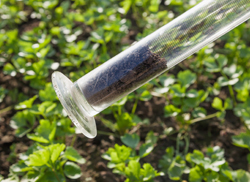
Infra-Red (IR) spectroscopy is routinely used to analyse soil samples and determine their suitability for different crops. BLGG Kenya Ltd was established as an IR-spectroscopy laboratory in October 2011 and features the latest technology in soil and compost analysis.
The company, which is a branch of the BLGG group that has agricultural laboratories all over Europe, uses a reference library of Kenyan soils developed by Dr Thomas Terhoven-Urselmans. The scientist worked for two years at the ICRAF institute in Nairobi, analysing hundreds of Kenyan soils using IR-spectroscopy and developed the database.
Partnership to aid farmers
The signing of an agreement between two companies involved in crop protection is good news for small-scale farmers. It is the partnership between Koppert Biological Systems (K) and Amiran Kenya to provide biological crop protection products that will not only control insect pests and diseases, but will also increase yields and thus raise farmer’s income.
Koppert Kenya has been in operation for the last six years, serving mainly flower and vegetable growers. Koppert is the international market leader in biological crop protection and natural pollination. It has been supplying sustainable solutions for the professional cultivation of vegetables, fruits and ornamental crops for 45 years.
In Kenya, the company has been supplying a wide range of bio-control tools, which include predatory mites, parasitic wasps, beneficial fungi, monitoring and mass trapping devices and other accessories.
These products have enabled farmers to maintain healthy crops with minimal reliance on chemical pesticides and they have been able to harvest more yields of a higher quality.
Koppert has always wished to target medium and small-scale farmers, who are the main drivers of agriculture in Kenya, and will now be able to reach them through its partnership with Amiran. Amiran, which will help in distribution of the products, was the first company to introduce affordable, tailor-made greenhouses for Kenyan farmers.
It has over 40 years of experience in the horticultural industry in East Africa. The company’s agricultural products include pesticides, fertilisers and seeds and large and small-scale agro-projects.
Amiran has also built and maintains 90 percent of Kenya’s greenhouses. The Koppert-Amiran partnership is behind the bio-control product known as Trianum. This helps to prevent soil-borne diseases, while increasing crop productivity. Since its introduction in Kenya, Trianum has given positive and consistent results. Kenyan farmers who have been using the product have reported the development of a more uniform and vigorous crop with a robust root system that is able to resist soil- borne diseases. Koppert checks every batch of Trianum to ensure the product meets its rigorous quality control requirements.
This is followed through the supply chain with clear instructions for the correct handling and storage of the product. Koppert Kenya has invested in a cool chain to guarantee the quality of Trianum from their distributing partner (Amiran) to the distributors and stockists and finally to the farmer. The coolers guarantee the farmer a top quality product that will deliver maximum result.
Trianum completely disperses in water to give a uniform suspension. This can be applied or drenched targeting the root zone using virtually all spraying or drenching equipment. The product can be used alongside all insecticides, nutritional products and with most fungicides. Trianum has been registered by the Pest Control Products Board.
As with every other resource invested in making a successful farming business, Kop- pert goes the extra mile to demonstrate that Trianum is economically viable and sustainable.
There are cost-benefit analysis reports on various crops, which prove that the extra money the farmer obtains from selling more produce of a higher quality is always more than the cost of Trianum. Besides Trianum, Koppert and Amiran Kenya are set to provide a wider range of sustainable biological products in future to all farmers.
